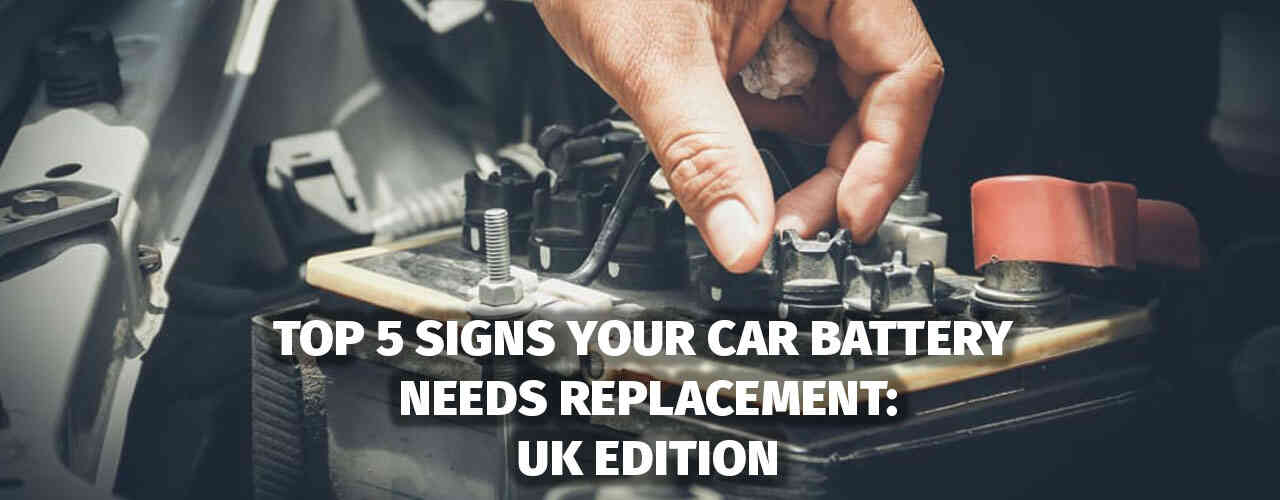As a responsible car owner, it's crucial to be aware of the signs that your car battery might be failing. A malfunctioning battery can leave you stranded at the most inconvenient times, causing unnecessary stress and inconvenience. In this article, we'll dive deep into theTop 5 Signs Your Car Battery Needs Replacement:
UK Edition, exploring each sign in detail, providing valuable insights, and offering expert advice on what to do when you encounter these warning signals. Whether you're a seasoned driver or a new car owner, this guide will equip you with the knowledge to ensure your vehicle runs optimally and reliably.Without further ado, let's explore the top 5 signs that indicate your car battery requires replacement. Keep in mind that addressing these signs promptly can prevent unexpected breakdowns and extend the lifespan of your battery.
1. Dimming Headlights and Electrical Issues
One of the first indications of a failing car batteryis the dimming of headlights and other electrical components. When you start your car, the battery supplies power to various systems, including the lights, radio, and air conditioning. If you notice that your headlights appear noticeably dimmer than usual, or your dashboard lights flicker intermittently, it could be a sign that your battery is struggling to hold a charge. Additionally, you might experience issues with power windows moving slower than usual or the radio resetting unexpectedly.
2. Slow Engine Crank
When you turn the ignition key, and your engine cranks slowly, or you hear a clicking sound without starting, it's a clear indication of a weak car battery. The battery's primary function is to provide the necessary electrical current to turn the engine over. If your battery is nearing the end of its lifespan, it might not have enough power to perform this essential task effectively. Ignoring this sign could lead to complete engine failure and leave you stranded.
3. Warning Light on the Dashboard
Modern cars are equipped with advanced onboard diagnostics systems that monitor the performance of various components, including the battery. If your car's battery icon or check engine light illuminates on the dashboard, it's a red flag indicating an issue with the battery. However, it's important not to solely rely on warning lights, as they may not activate until the battery is significantly weakened. Regularly checking your battery's health is essential, especially if your vehicle is several years old.
4. Foul Odor or Corrosion Around the Battery
While inspecting your car's battery, keep an eye out for visual clues of potential issues. If you notice a foul smell, similar to rotten eggs, near the battery, it could indicate that the battery is leaking or producing excessive heat. Additionally, check for any corrosion around the battery terminals. Corrosion buildup can interfere with the battery's connection to the electrical system, leading to poor performance and eventual failure.
5. Old Age of the Battery
On average, car batteries have a lifespan of about 3 to 5 years. If you can't recall the last time you replaced your battery and it's been several years, chances are it's time for a new one. Even if your battery is currently functioning well, it's best to be proactive and replace it before it fails unexpectedly. Regular maintenance and periodic checks can help you stay ahead of potential battery issues and ensure your car remains dependable.
Frequently Asked Questions (FAQs)
Let's address some common queries related to car batteries and their replacements:
FAQ 1: How often should I replace my car battery?
It's recommended to replace your car battery every 3 to 5 years, depending on various factors such as climate, driving habits, and the type of battery.
FAQ 2: Can I jump-start my car if the battery is weak?
Yes, you can jump-start your car using jumper cables and a working vehicle. However, remember that jump-starting is a temporary solution, and it's essential to get your battery tested and replaced if needed.
FAQ 3: What can I do to extend my car battery's lifespan?
Regularly inspect and clean the battery terminals, keep your car parked in a garage or shaded area to avoid extreme temperatures, and avoid using electronic devices when the engine is off.
FAQ 4: How can I safely dispose of an old car battery?
Old car batteries are hazardous waste and should be taken to authorized recycling centers or automotive shops for proper disposal.
FAQ 5: Can a faulty alternator mimic a failing battery?
Yes, a faulty alternator can cause similar symptoms to a failing battery, such as dimming headlights and difficulty starting the engine. If you've ruled out the battery as the issue, have your alternator checked by a professional mechanic.
FAQ 6: Should I choose a maintenance-free or low-maintenance battery?
Maintenance-free batteries require less upkeep as they are sealed and do not require topping up with distilled water. However, low-maintenance batteries might be more affordable and provide the option to check and add water when necessary.
Conclusion
Your car's battery is the heart of its electrical system, and recognizing the signs of a failing battery is essential for your safety and convenience. By paying attention to dimming headlights, slow engine cranks, warning lights, foul odors, and the battery's age, you can proactively address battery issues and avoid unexpected breakdowns on the road. Regular maintenance, professional checks, and timely replacements can keep your car battery in optimal condition, ensuring your vehicle runs smoothly throughout its life.
Now that you're equipped with the knowledge to identify signs of a failing car battery, take proactive measures to keep your car running reliably in the UK. By staying informed and attentive, you'll have the confidence to handle any battery-related challenges that come your way.




